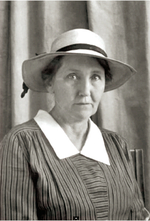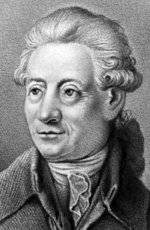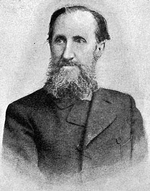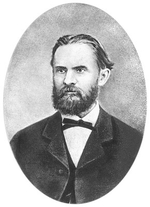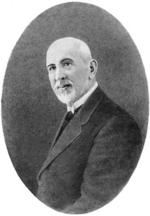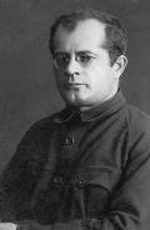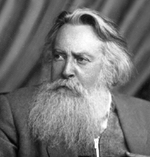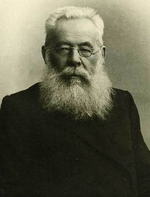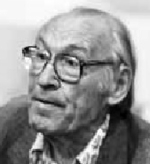Articles
Gagen-Torn Nina (1900–1986)
Gagen-Torn Nina (1900–1986) – ethnographer, folklorist. Post-graduate courses of the Leningrad Institute of Comparative History of Literatures and Languages of the West and East (1927-1930); member of the Commission for Studying the Tribal Structure of the Population of the U.S.S.R., she worked at the State Academy of the History of Material Culture, Institute of Anthropology and Ethnography (since 1933), Institute of the Peoples of the North (1931–32). Secretary of the Editorial Board of ‘Sovetskaya etnografiya’ Magazine (1934).
She learnt at the Gymnasium of M. N. Stoiunina, then at the Gymnasium of Princess Obolenskaya. In the autumn of 1918, she enrolled to the Department of Social Studies of the Petrograd University; her teacher was writer Andrey Belyi, She was interested in ethnography, visited lectures by L. Ya. Sternberg.
Read More
Georgi Johann (1729–1802)
Georgi Johann (1729–1802) – chemist, ethnographer, traveler of the German origin.
Dortor of Medicine (University of Uppsala), disciple of C. Linneus. He came to Russia on the invitation of the Imperial Academy of Sciences and Arts in 1768. Professor in Mineralogy, Adjunct (1776) and Academician of the Ac. of Sc. (1783). Participant of the expedition of P. Pallas to Siberia.
In the result of his own expeditions to the Volga region, Siberia, the Urals, the Baikal Region, and the Far East, he – for the first time – gave a general historical and ethnographical survey of the peoples of Siberia and Russia.
Read More
Gerie Vladimir (1837–1919)
Gerie Vladimir (1837–1919) – historian and philosopher, Correspondent Member of the Ac. Of Sc. (1902), member of the Society of Russian History and Antiquities, Russian Historical Society in St. Petersburg, Chairman of the Historical Societies at the Moscow University. He studied philosophy of history, mythology, literature, and history of religion.
In 1854, he entered the Historical and Philological Faculty of the Moscow University; there he met historian T. N. Granovsky. In 1862, he defended his Master thesis ‘Fighting for the Polish Throne in 1733’; and in 1868 – Doctor thesis ‘Leibnitz and His Age’.
Read More
Girgas Vladimir (1835–1887)
Girgas Vladimir (1835–1887) – Orientalist, specialist in Arabic studies.
In 1854, he enrolled at the Oriental Faculty of the St. Petersburg University, and graduated from it in 1858, as the first candidate. In 1859, he went to Paris for two years to study Arabic and Turkish languages. His interest to Arabic studies as formed under the influence of Caussin de Perceval and Joseph Toussaint Reinaud. In 1861, G. was sent by the university to the East (Syria, Palestine, Egypt) to develop his Arabic and to study Moslem Law; he was there in 1861-1864. In 1865, he defended his Master thesis ‘Rights of Christians at the East, According to the Moslem Law’. In the same year he became Docent at the Chair of Arabic Literature.
Read More
Glinka Gregory (1774–1818)
Glinka Gregory (1774–1818) – philologist, translator, State Councilor.
He studied at the Pageant Corpus, worked as Censor of foreign books in Kronstadt. In 1802, he got a position of Professor of Russian Language at the University of Dorpat, where he wrote a manual in Russian for the Ostsee Region (1805). In 1811, he was invited by Empress Maria Fedorovna to the Court, where he taught Russian to Empress Elisabeth Alekseevna, great princes and the future Emperor Nickolas I, whom he accompanied in his travel to Europe in 1816.
Read More
Golenishchev Vladimir (1856–1947)
Golenishchev Vladimir (1856–1947) – Russian Orientalist: Egyptologist, specialist in Assyrian and Semitic studies. State Councilor.
In 1870, he graduated from the Faculty of Oriental Languages of the St. Petersburg University; his supervisors were V. R. Rozen (Arabic), and D. A. Khvolson (Ancient Hebrew); he studied Egyptology and Assyrian studies by himself. Since 1879, he organized expeditions to Egypt for his own account, made archeological excavations, collected written monuments and pieces of art of the Ancient East. Since 1886, he was Curator of the Egyptian and Assyrian collection of the Hermitage, composed the first catalogues for those collections. He prepared the first publications of a number of texts of the Ancient East: ‘Tale of the Shipwrecked Sailor’, ‘Prophesy of Neferti’, ‘Teaching of the Tsar of Heliopolis for His Son Merykara’, ‘Travel of Unu Amon to Byblos’, Cappadocian cuneiform texts from Minor Asia, inscriptions of tsars of Urartu, Fayum portraits. In 1909, he had to sell his collection of antiquities (ab. 600 objects) to the Museum of Fines Arts in Moscow.
Read More
Golman (Glan) Yakov (1894—1970)
Golman (Glan) Yakov (1894—1970) – translator, journalist.
He learnt at the gymnasium of the town of Mogilev, the Mogilev Province (since 1907), learnt by himself as well. In 1910, he assigned to the Moscow University. In 1918, he moved to the town of Morshansk, where he worked as lecturer of the People’s Commissariat for Education (under the pseudonym of M.N. Putintsev).
In 1920, he returned to Moscow, where he was arrested for the first time; he was under the arrest till 1922. Since mid-1920-s, he has worked for various newspapers, and magazines, including those of the League of Militant Atheists, ‘Bezbozhnik’ (Atheist) Magazine, and ‘Ateist’ Publishing House, and also he wrote as historiographer, bibliographer, and translator. His main pseudonym was Ya. M. Glan.
Read More
Golosovker Yakov (1890–1967)
Golosovker Yakov (1890–1967) – philosopher, writer, translator.
In 1913, he graduated from the Historical and Philological Faculty of the St Vladimir University in Kiev. He wrote diplomas in philology (on the poesy of Sappho) and in philosophy (on the philosophy of Rickert). In 1919-1920, he was sent the Head of the Narkompros A. V. Lunacharsky to the Crimea for the protection of cultural monuments. In 1922-1923, he visited lectures of U. von Wilamowitz-Moellendorf in Berlin, and wrote a work on rhythm and melody of the Greek melikos. Having returned to Moscow, he taught at the Second Moscow University and at the High Literary Courses. He published his works since 1913 (classical translations) and 1916 (lyrical poetry); since the late 1920-s, he actively translated German and classical literary and philosophical texts, wrote his own compositions at the border of philosophical essays, poetry and meditative lyrics.
Read More
Golubinsky Eugeny (1834–1912)
Golubinsky Eugeny (1834–1912) – ecclesiastic historian.
He was born in the family of Priest Evstigney Peskov in Kostroma; he gave his son surname Golubinsky in honour of Russian philosopher Archpriest F. A. Golubinsky.
He learnt at a spiritual school in Soligalich, than he was sent to the Kostroma Spiritual Seminary; after it he enrolled to the Moscow Spiritual Academy and got state grant for education. His Master thesis was on the relations between Church and State in Byzantium in the Fourth – Sixth Centuries; later it was published in the magazine of the Moscow Spiritual Academy. A year earlier G. got a position of teacher in Rhetoric at the Vifanskaya Seminary. In January 1861, he became Bachelor of the Moscow Spiritual Academy at the Chair of the History of Russian Church.
Read More
Gordienko Nikolay (1929‒2011)
Gordienko Nikolay (1929‒2011) – Soviet philosopher and specialist in religious studies.
After a secondary school in the town of Druzhkovka, Donetsk Region (Ukraine), in 1948, he entered the Philosophical Faculty of the Leningrad State University. He got qualification of teacher of Marxist-Leninist philosophy; he made Candidate thesis under the supervision of Prof. V.P. Tugarinov, and started to work as a school teacher in Leningrad (1953-1957). In 1957, he started to work at the Chair of Philosophy at the Leningrad Sanitarian Hygienic Medical Institute, as Assistant, than Senior Teacher. He worked at the ‘Virgin Lands’ (in 1958, he was awarded with a medal for the participation in that Soviet agricultural project).
Read More
Showing 71-80 of 351 items.

